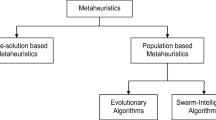Abstract
Algorithm Development Environment for Problem Solving (ADEP) is a development platform catering to the needs of designing and exploring computationally viable configurations of metaheuristic algorithms. It is motivated by the lack of tools capable of capitalizing on the richness of memetic computing techniques that surfaced in recent years. This software review article introduces the functional features of ADEP and describes the the various utility modules within the ADEP metaheuristics framework, in particular the LVRP tree data structure, configuration and simulation visualization, and the automated configuration via the problem-driven learning engine.
Similar content being viewed by others
References
Chen XS, Ong YS, Lim MH, Tan KC (2011) A multi-facet survey of memetic computing. IEEE Trans Evol Comput 15(5): 591–607
Lim MH, Krasnogor N, Ong YS, Gustafson S (2012) Editorial, Memetic Comput 4:1
Lim MH, Gustafson S, Krasnogor N, Ong YS (2009) Editorial. Memetic Comput 1(3): 173–174
Voudouris C, Dorne R, Lesaint D, Liret A (2001) iopt: A software toolkit for heuristic search methods. In: CP01, Paphos, pp 716–729. Springer, Berlin
Gaspero LD, Schaerf A (2000) Easylocal++: An object-oriented framework for flexible design of local search algorithms. Softw Practice Experience 33(8): 733–765
Fink A, Voβ S (2002) Hotframe: a heuristic optimization framework. Optimization Software Class Libraries, OR/CS Interfaces Series. Kluwer Academic Publishers, Boston, pp 81–154
Jones M, McKeown G, Rayward-Smith V (1998) Templar: An object-oriented framework for distributed combinatorial optimzation. In: Proceedings of the UNICOM Seminar on Modern Heuristics for Decision Support. UNICOM Ltd, Brunei University, UK
Schaerf A, Lenzerini M, Cadoli M (Jul 1999) Local++: a C++ framework for local search algorithms. In: Proceedings of technology of object-oriented languages and systems, pp 152–161
Andreatta AA, Carvalho SER, Ribeiro CC (1998) An object-oriented framework for local search heuristics. In: Proceedings of the technology of object-oriented languages and systems (TOOLS ’98). IEEE Computer Society, Washington, DC, pp 33
Shaw P, Backer BD, Furnon V (2002) Improved local search for CP toolkits. Ann Oper Res 115(1):31–50
Collet P, Lutton E, Schoenauer M, Louchet J (Sept 2000) Take it EASEA. In: Lecture notes in computer science, vol 1917 archive. Proceedings of the 6th international conference on parallel problem solving
Veenhuis C, Franke K, Koppen M (2000) A semantic model for evolutionary computation. In: Proceedings of 6th international conference on soft computing
Wall M (1996) GAlib: A C++ library of genetic algorithm components. Mechanical Engineering Department. Massachusetts Institute of Technology
Keijzer M, Merelo JJ, Romero G, Schoenauer M (2001) Evolving objects: a general purpose evolutionary computation library. In: EA-01, evolution artificielle, 5th international conference in evolutionary algorithms, pp 231–244
HEEDS (2002) Hierarchical Evolutionary Engineering Design System. Getting Started Manual
Lassila O (1996) Ozone temporal constraint propagator. Technical Report CMU-RI-TR-96-12, Robotics Institute, Pittsburgh
Birattari M, Stutzle T, Paquete L, Varrentrapp K (2002) A racing algorithm for configuring metaheuristics. In: Proceedings of the genetic and evolutionary computation conference, pp 11–18. Morgan Kaufmann, San Fransisco
Stanley KO, Bryant BD, Miikkulainen R (2005) Real-time neuroevolution in the nero video game. IEEE Trans Evol Comput 9(6): 653–668
Koza JR (1992) Genetic programming: on the programming of computers by means of natural selection. complex adaptive systems. The MIT Press, Cambridge
Burke E, Kendall G, Newall J, Hart E, Ross P, Schulenburg S (2003) Hyper-heuristics: an emerging direction in modern search technology. In: Handbook of metaheuristics, International series in operations research & management science, Chap. 16, pp 457–474
Ong YS, Keane AJ (2004) Meta-lamarckian learning in memetic algorithms. IEEE Trans Evol Comput 8(2): 99–110
Ong YS, Lim MH, Zhu N, Wong KW (2006) Classification of adaptive memetic algorithms: a comparative study. IEEE Trans Syst Man Cybern Part B 36(1): 141–152
Nguyen QH, Ong YS, Lim MH (2008) Non-genetic transmission of memes by diffusion. In: GECCO’08: proceedings of the 10th annual conference on genetic and evolutionary computation, pp 1017–1024. ACM, New York
Dawkins R (1989) The selfish gene. Clarendon Press, Oxford
Krasnogor N, Smith J (2001) Emergence of protable search strategies based on a simple inheritance mechanism. In: The genetic and evolutionary computation conference, pp 432–439. San Francisco
Smith J (2002) Co-evolving memetic algorithms: initial investigations. In: Parallel problem solving from nature—PPSN VII, pp 537–548
Krasnogor N (1999) Co-evolution of genes and memes in memetic algorithms. In: Proceedings of the 1999 genetic and evolutionary computation conference workshop program, p 371
Krasnogor N, Gustafson S (2002) Toward truly ”‘memetic”’ memetic algorithms: discussion and proof of concepts. In: Advances in nature-inspired computation: the PPSN VII workshops, pp 21–22
Krasnogor N, Gustafson S (2004) A study on the use of “self-generation” in memetic algorithms. Nat Comput 3(1): 53–76
Lim KK, Ong YS, Lim MH, Chen XS, Agarwal A (Nov 2007) Hybrid Ant colony algorithm for path planning in Sparse graphs. Soft Comput J 981–994
Agarwal A, Xu YL, Lim MH (2003) Graph compression via compaction of degree-2 nodes for urav visitation sequencing. Unmanned Vehicle System Technologies
Tang J, Lim MH, Ong YS (2007) Diversity-adaptive parallel memetic algorithm for solving large scale combinatorial optimization problems. Soft Comput J 11(9): 873–888
Tang J, Lim MH, Ong YS (2006) Parallel memetic algorithm with selective local search for large scale quadratic assignment problems. Int J Innov Comput Inf Control 2(6): 1399–1416
Tang J, Lim MH, Ong YS (2006) Adaptation for parallel memetic algorithm based on population entropy. In: Proceedings of the 8th annual conference on genetic and evolutionary computation (GECCO), Seattle, Washington, pp 575–582 (Best paper Award Nomination)
Burkard RE, Karisch SE, Rendl F (1997) QAPLIB—a quadratic assignment problem library. J Glob Optim 10(4): 391–403
Author information
Authors and Affiliations
Corresponding author
Rights and permissions
About this article
Cite this article
Chen, X. An algorithm development environment for problem-solving: software review. Memetic Comp. 4, 149–161 (2012). https://doi.org/10.1007/s12293-012-0083-1
Received:
Accepted:
Published:
Issue Date:
DOI: https://doi.org/10.1007/s12293-012-0083-1




